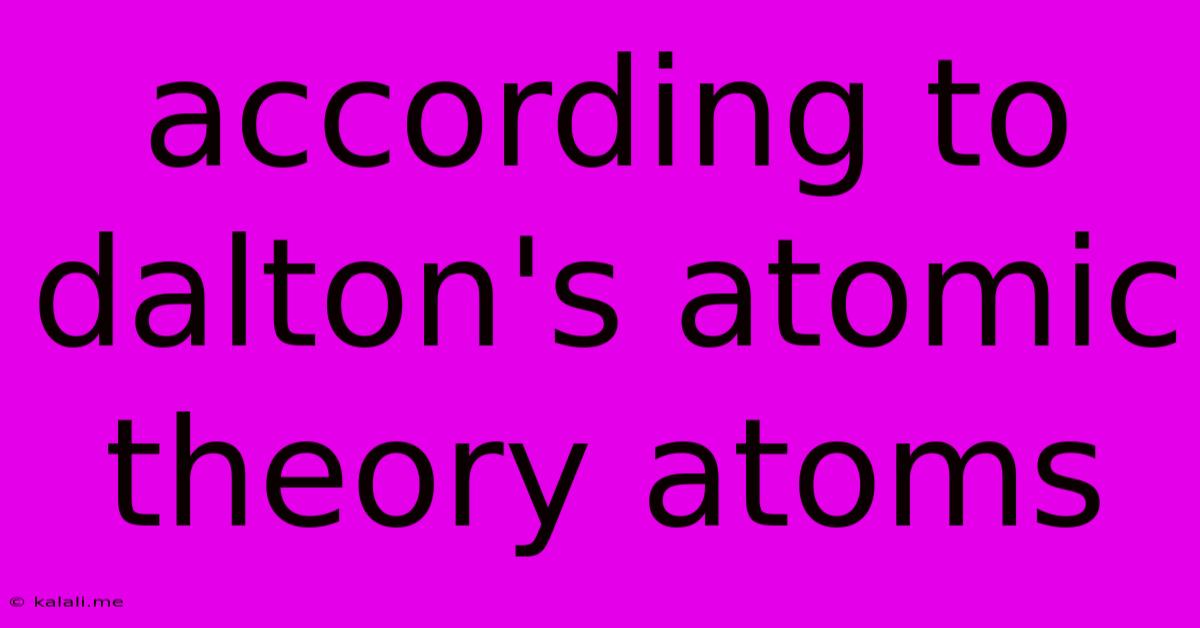According To Dalton's Atomic Theory Atoms
Kalali
Jun 15, 2025 · 3 min read

Table of Contents
According to Dalton's Atomic Theory: A Deep Dive into the Building Blocks of Matter
John Dalton's atomic theory, proposed in the early 1800s, revolutionized our understanding of matter. While not entirely accurate by modern standards, it laid the groundwork for much of our current knowledge of chemistry and physics. This article will explore the postulates of Dalton's atomic theory, its significance, and its limitations. Understanding Dalton's work provides a crucial foundation for grasping more complex atomic models.
Postulates of Dalton's Atomic Theory
Dalton's theory, based on experimental observations and chemical laws, rested on several key postulates:
-
All matter is composed of indivisible and indestructible atoms: Dalton envisioned atoms as the fundamental, solid building blocks of all substances. He believed they could not be created or destroyed through chemical reactions.
-
All atoms of a given element are identical in mass and properties: This postulate stated that atoms of the same element are indistinguishable from one another, possessing identical mass and other characteristics. This implies uniformity within an element.
-
Atoms of different elements have different masses and properties: This differentiates atoms of one element from another. Each element possesses unique atomic mass and properties. This postulate is crucial for distinguishing between different substances.
-
Atoms combine in simple, whole-number ratios to form chemical compounds: This explains the law of definite proportions, stating that a compound always contains the same elements in the same proportion by mass. For example, water always has a 2:1 ratio of hydrogen to oxygen atoms.
-
Atoms can rearrange during chemical reactions, but they are neither created nor destroyed: This postulate supports the law of conservation of mass, where the total mass of reactants equals the total mass of products in a chemical reaction. Atoms simply change their arrangement, not their inherent nature.
Significance of Dalton's Atomic Theory
Dalton's theory was revolutionary for several reasons:
- Explained Existing Laws: It provided a microscopic explanation for macroscopic observations like the law of conservation of mass and the law of definite proportions.
- Unified Chemical Knowledge: It brought together various observations into a coherent framework, providing a unifying principle for chemical reactions.
- Foundation for Further Research: It stimulated further investigations into atomic structure and chemical bonding, paving the way for more sophisticated models.
- Basis for Stoichiometry: Dalton's theory is fundamental to stoichiometry, the quantitative study of reactants and products in chemical reactions.
Limitations of Dalton's Atomic Theory
Despite its significance, Dalton's theory had limitations:
- Atoms are Divisible: Subatomic particles like protons, neutrons, and electrons were discovered later, proving atoms are not indivisible. This challenged the first postulate.
- Isotopes Exist: Atoms of the same element can have different masses (isotopes), contradicting the second postulate. Isotopes have the same number of protons but varying numbers of neutrons.
- Molecular Compounds: Some compounds exist as molecules, which are groups of atoms chemically bonded together, exceeding the simple ratios envisioned by Dalton.
Conclusion
John Dalton's atomic theory, though imperfect, marked a pivotal moment in the history of science. It provided a powerful framework for understanding matter at the atomic level, explaining existing chemical laws and laying the foundation for future discoveries. While later models refined and extended his work, Dalton's contribution remains fundamental to our understanding of chemistry and the nature of matter. His theory serves as a testament to the power of observation, hypothesis formation, and the ongoing evolution of scientific knowledge.
Latest Posts
Latest Posts
-
Which Of The Following Substances Is Not A Solution
Jun 15, 2025
-
What Is Required To Access The Internet
Jun 15, 2025
-
Generally Accepted Accounting Principles Pdf Notes
Jun 15, 2025
-
Which Planet Has The Strongest Magnetic Field
Jun 15, 2025
-
How To Find Area With Coordinates
Jun 15, 2025
Related Post
Thank you for visiting our website which covers about According To Dalton's Atomic Theory Atoms . We hope the information provided has been useful to you. Feel free to contact us if you have any questions or need further assistance. See you next time and don't miss to bookmark.